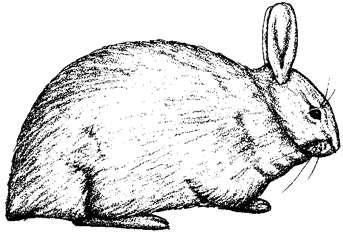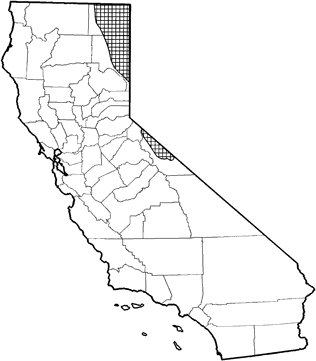
Pygmy Rabbit
Distribution, Abundance, and Seasonality
The pygmy rabbit is uncommon and local in Great Basin habitats of Modoc, Lassen, and Mono cos. This species is found in sagebrush, bitterbrush, and pinyon-juniper habitats (Orr 1940, Severaid 1950, Green and Flinders 1980).

Range Map
Specific Habitat Requirements
Feeding: Big sagebrush is highly preferred, providing up to 99% of the diet in winter. Grasses provide up to 40% of the diet from mid-summer to fall; a variety of grasses and forbs is eaten (Green and Flinders 1980). Bitterbrush is taken only rarely, even though it may be dense in the pygmy rabbit's habitat (Green and Flinders 1980). Forages on the ground and in shrubs. May store food in burrow.
Cover: The pygmy rabbit may be the only rabbit to dig its own burrows (Nowak and Paradiso 1983). Burrows have several entrances (up to 10), and are located in slopes oriented in a north-to-east direction. Chambers may be 1 m (3.3 ft) deep. In dense brush, the pygmy rabbit may use forms during the day instead of burrows. During winter, it makes a network of subnivean trails at the bases of shrubs for cover and feeding.
Reproduction: It is assumed that burrows are the nesting sites, though no chambers of nesting materials have been found (Green and Flinders 1980).
Water: No data found.
Pattern: Associated with tall, dense, large-shrub stages of big sagebrush, greasewood, and rabbitbrush. Populations are patchy in distribution. Heavily grazed areas may be avoided.
Species Life History
Activity Patterns: Yearlong crepuscular activity. May be active in mid-day.
Seasonal Movements / Migration: No data found .
Home Range: Most activity is within 30 m (100 ft) radius of burrow (Nowak and Paradiso 1983). Densities in Utah were 0.7 to 1.4 per ha (2.5 ac), and in Idaho were 45 per ha (2.5 ac) (Green and Flinders 1980).
Territory: No data found.
Reproduction: Mating occurs from late February to early May. After a 27- to 30-day gestation period, the young are born from March to early August. Litter size averages 6, and 3 litters per year have been reported in Idaho (Green and Flinders 1980). The young are altricial. Mortality is highest in late winter and early spring.
Niche: Weasels are the principal predator, followed by coyotes, foxes, owls, and hawks (Orr 1940, Ingles 1965, Green and Flinders 1980). The pygmy rabbit is sympatric with the black-tailed and white-tailed hares and Nuttall's cottontail in California, but there is no information on interspecific relations.
Comments: Hall (1981) and most previous authors placed this species in the Genus Sylvilagus, but Green and Flinders (1980) classified it as Brachylagus idahoensis, as do most recent authors. A California Species of Special Concern (Williams 1986).
Sources & References
California Department of Fish and Game, 1999.
California's Wildlife, Sacramento, CA.
Written by: G. Hoefler, reviewed by: H. Shellhammer, edited by: J. Harris, S. Granholm
Green, J. S., and J. T. Flinders. 1980. Brachylagus idahoensis. Mammal. Species No. 125. 4pp.
Hall, E. R. 1981. The mammals of North America. Second ed. 2 Vols. John Wiley and Sons, New York. 1271pp.
Ingles, L. G. 1965. Mammals of the Pacific states. Stanford Univ. Press, Stanford, CA. 506pp.
Nowak, R. M., and J. L. Paradiso. 1983. Walker's mammals of the world. 4th ed. 2 vols. John Hopkins Univ. Press, Baltimore, MD. 1362pp. Orr, R. T. 1940. The rabbits of California. Calif. Acad. Sci. Occas. Pap. No. 19. 227pp.
Severaid, J. H. 1950. The pigmy rabbit (Sylvilagus idahoensis) in Mono County, California. J. Mammal. 31:1-4. Williams, D. F. 1986. Mammalian species of special concern in California. Calif. Dept. Fish and Game, Sacramento. Admin. Rep. 86-1. 112pp.
California Animal Facts | California's Wildlife